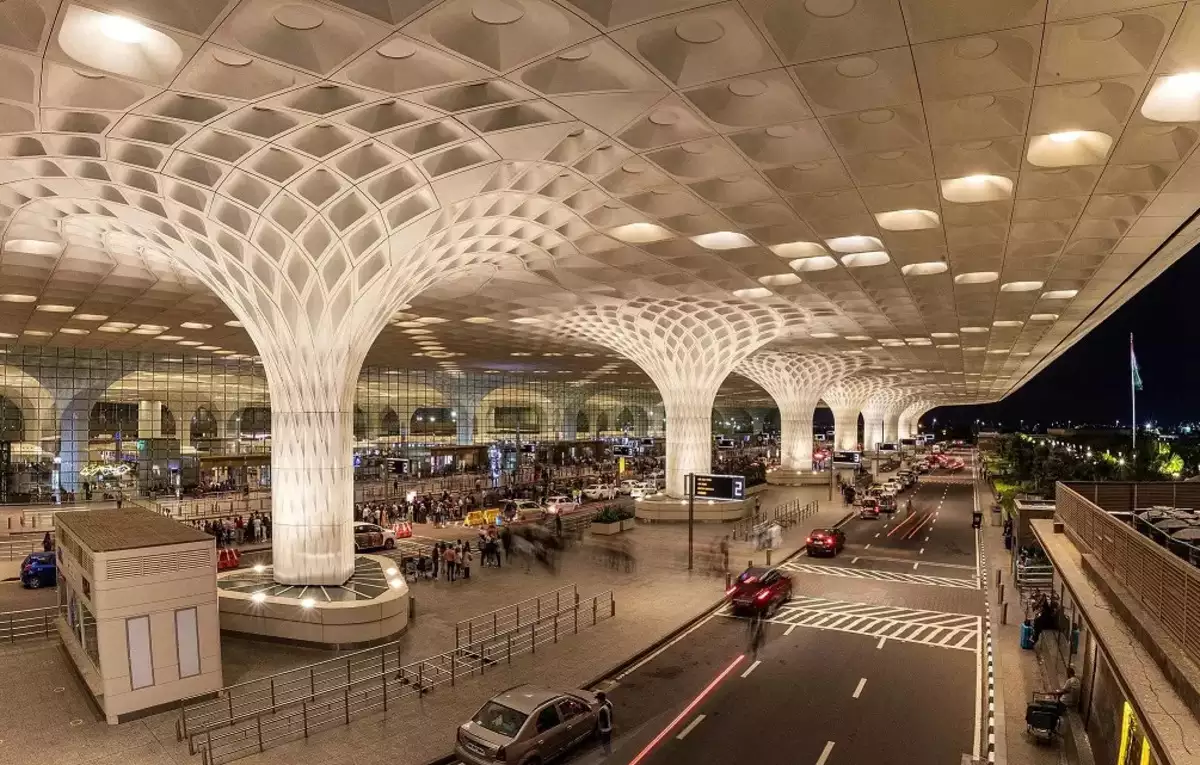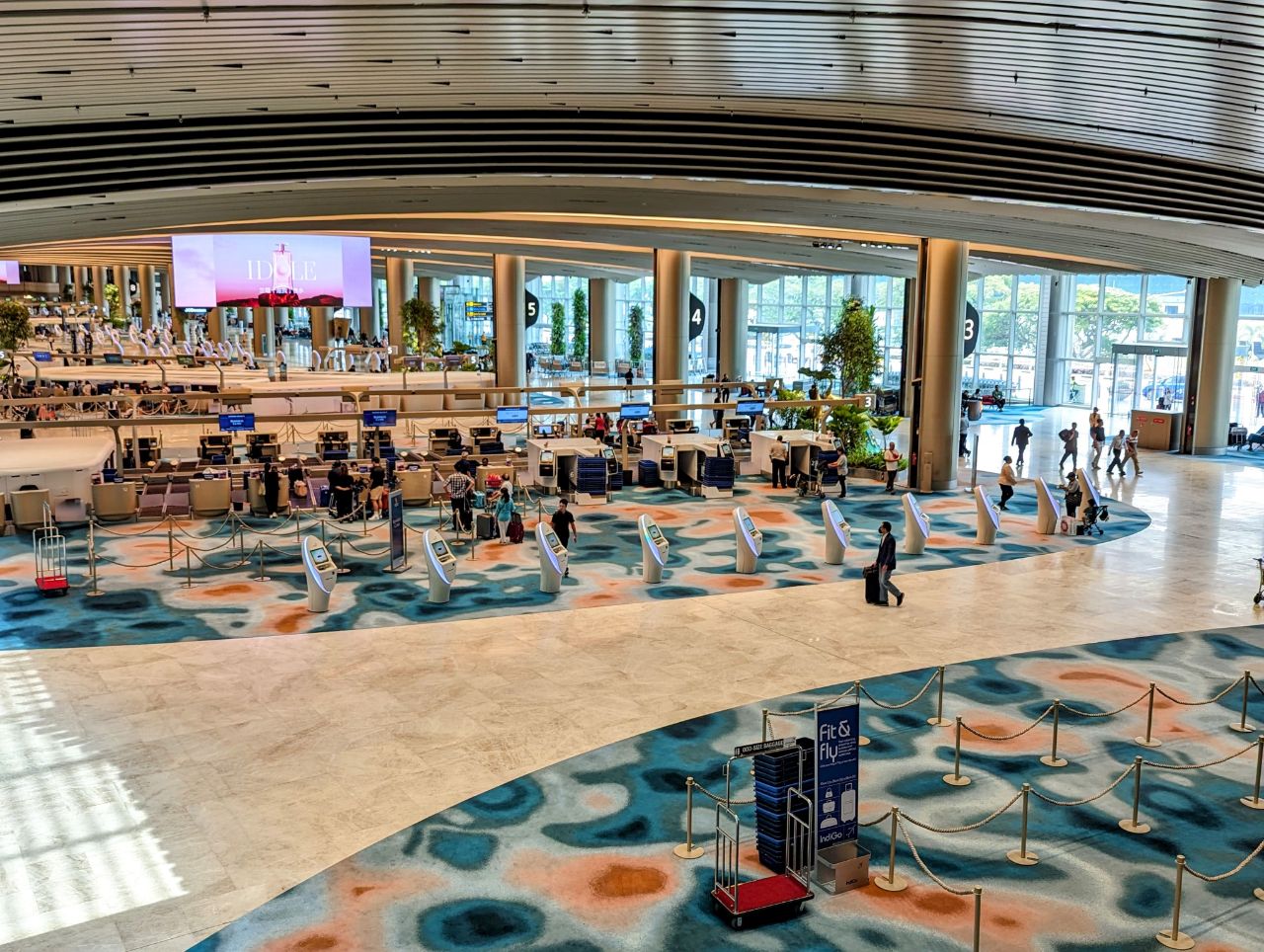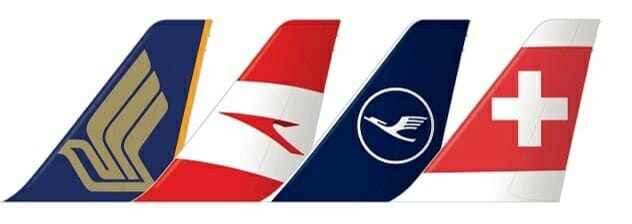When travelling on separate tickets, the ability to get all your boarding passes upfront and check your bags through to the final destination can mean the difference between a seamless connection and a stressful rush- or even denied boarding!
This is known as an interline agreement, and is one of the most basic kind of partnerships between airlines (below a codeshare, alliance or joint venture).
In this post we’ll look at what interlining is, with a particular focus on Singapore Airlines.
What is interlining?

While there’s probably a more technically correct definition, you can think of interlining simply as an agreement that allows Airline A to send passengers onto Airline B, without requiring them to reclaim their luggage or check-in again.
Interlining arrangements allow for the sale of a single ticket comprising of multiple airlines, as illustrated in the example below from SIN to ZRH to NCE, with the first leg on Singapore Airlines and the second leg on SWISS.

However, interlining arrangements also create the possibility of a passenger enjoying the same convenience, even when travelling on separate tickets.
Of course, in an ideal world you’d simply book everything on a single ticket, but that’s not always possible:
- You might book awards across two different programmes
- It might be cheaper to book two separate tickets than one combined ticket
And in these situations, the presence of an interline arrangement can either be a matter of convenience, or absolute necessity.
Convenience
Suppose I want to fly from SIN to MXP, but can only find Business Class award space on Qatar Airways from KUL to DOH to MXP. In that case, I might buy or redeem a separate Singapore Airlines ticket to reposition to KUL.
Since Singapore Airlines and Qatar Airways interline, I can get my boarding passes for the entire journey in SIN and check my bag all the way through to MXP, eliminating the need to clear immigration in KUL, claim my bag, check in, and clear departure immigration again.
Necessity

If you have two separate tickets from A > B and B > C, but cannot enter country B without a visa (and don’t intend to apply for one), then you must be able to check your bag all the way through from A > B > C, since you can’t enter country B to retrieve and re-check it.
This isn’t so big an issue for Singaporeans, because our passport provides visa-free access to so many countries (though if you were flying on separate tickets through say, India, then you would need an Indian visa to enter the country if your bag can’t be checked all the way).
However, it could very well be a problem for other nationalities. You should note that some airlines will err on the side of caution and refuse check-in if you don’t have the right documentation to enter the “transit” country (since they’re on the hook for the costs of repatriating you should anything go wrong), so buying separate tickets in this case is a much riskier matter.
Will Singapore Airlines interline on separate tickets?

Singapore Airlines’ official policy on interlining and through checking baggage on separate tickets is as follows.
|
How can I through-check my baggage to my final destination if I am travelling on separate tickets? Where through-checks are possible, you may request for it by informing our check-in counter staff at the airport. This service is only available if:
Please note that through-checks may not be available on routes previously permitted, due to document checks required. If you are transferring/transiting through Singapore, you must ensure you are booked on a single itinerary. Read more about transiting in Singapore here. Where through-check of baggage is not available between SIA and your connecting airline, please ensure the following prior to planning your travel:
|
In short, Singapore Airlines will check through bags on separate tickets, provided the following three conditions are met:
- SIA has an interline agreement with the other airline
- the minimum connection time is met
- the connecting point accepts through-checked bags
Do note that this refers to a situation where Singapore Airlines is the first airline you’re flying; other airlines may have different policies and may not check your bag through, notwithstanding the fact the above three points are met.
SIA’s interline agreements

At the time of writing, Singapore Airlines has interline agreements with more than 100 carriers worldwide. The information below is extracted from the KVS Tool (which requires a paid subscription to access).
[KVS Tool 11.5.3 – Reference: Interline Agreements [IET]: SQ]
|
ELECTRONIC INTERLINE CARRIER AGREEMENTS-SQ AA – AC – AD – AE – AF – AH – AI – AM – AS – AT – AV – AY – AZ – A3 – BA – BG – BI – BR – BT – B6- B7 – CA – CI – CM – CX – CZ – DJ – DL – EI – EK- EN – ET – EW – EY – FI – FJ – FM – FZ – GA – GF G3 – HA – HM – HO – HR – HU – HX – HY – IB – IC – IY – JJ – JL – JO – JU – KC – KE – KF – KL – KM KQ – KU – LA – LG – LH – LM – LO – LP – LR – LX- LY – ME – MF – MH – MI – MK – MS – MU – NF – NH- NX – NZ – OA – OM – OS – OU – OZ – O6 – PD – PG – PK – PR – PS – PX – PZ – QF – QR – QV – RA – RJ -RO – SA – SB – SC – SK – SN – SQ – SV – SW – TA -TG – TK – TP – TR – T0 – UA – UB – UK – UL – UX -VA – VL – VN – VS – VY – WF – WY – W2 – XL – ZH- 4M – 4U – 4Y – 4Z – 9B – 9W |
You can look up airline codes via the IATA website, but for convenience, I’ll list them in a drop down box below (do note that some of these airlines are no longer in operation, but remain in the system nonetheless).
SQ Interline agreements
Code
AA
AC
Air Canada
AD
AE
AF
Air France
AH
Air Algerie
AI
Air India
AM
Aeroméxico
AS
Alaska Airlines
AT
Royal Air Maroc
AV
Avianca
AY
Finnair
AZ
ITA Airways
A3
Aegean Airlines
BA
British Airways
BG
BI
BR
EVA Air
BT
airBaltic
B6
JetBlue Airways
B7
Uni Air
CA
Air China
CI
China Airlines
CM
COPA Airlines
CX
Cathay Pacific
CZ
DJ
Air Djibouti
DL
Delta Air Lines
EI
Aer Lingus
EK
Emirates
EN
Air Dolomiti
ET
EW
Eurowings
EY
Etihad Airways
FI
Icelandair
FJ
Fiji Airways
FM
FZ
flydubai
GA
GF
Gulf Air
G3
GOL Airlines
HA
HM
Air Seychelles
HO
Juneyao Airlines
HR
Croatia Airlines
HU
Hainan Airlines
HX
HY
IB
Iberia Airlines
IC
IY
Yemenia
JJ
LATAM Brasil
JL
Japan Airlines
JO
Royal Jordanian
JU
Air Serbia
KC
Air Astana
KE
Korean Air
KF
Blue Air
KL
KLM
KM
Air Malta
KQ
Kenya Airways
KU
Kuwait Airways
LA
LATAM Chile
LG
Luxair
LH
Lufthansa
LM
Loganair
LO
LP
LAN Peru
LR
LACSA
LX
SWISS
LY
ME
MF
XiamenAir
MH
MI
Silkair
MK
Air Mauritius
MS
EgyptAir
MU
NF
Air Vanuatu
NH
NX
Air Macau
NZ
OA
Olympic Air
OM
OS
Austrian Airlines
OU
Croatia Airlines
OZ
Asiana Airlines
O6
Onyx Airlines
PD
Porter Airlines
PG
PK
PR
PS
PX
Air Niugini
PZ
QF
Qantas
QR
Qatar Airways
QV
Lao Airlines
RA
RJ
Royal Jordanian
RO
TAROM
SA
SB
Aircalin
SC
SK
SAS
SN
SQ
SV
SW
Air Namibia
TA
TACA Airlines
TG
Thai Airways
TK
Turkish Airlines
TP
TAP Portugal
TR
Scoot
T0
Helvetic Airways
UA
United Airlines
UB
UK
Vistara
UL
UX
Air Europa
VA
Virgin Australia
VL
Jetstar
VN
Vietnam Airlines
VS
Virgin Atlantic
VY
Vueling Airlines
WF
Widerøe
WY
Oman Air
W2
Wizz Air
XL
LATAM Ecuador
ZH
4M
Lanmei Airlines
4U
Germanwings
4Y
Discover Airlines
4Z
9B
AccessRail
9W
Jet Airways
Note that the list is not limited merely to Star Alliance carriers; SQ has interline agreements even with oneworld, SkyTeam and unaligned airlines. Interline agreements also exist with budget carriers such as Vueling and Wizz Air.
Minimum Connection Time (MCT) is met
If you want to check your bag across two separate tickets, you must make sure the Minimum Connecting Time (MCT) is satisfied (it should go without saying that an itinerary sold on a single ticket will always respect the MCT).
As the name suggests, MCT is the minimum time between the scheduled arrival of one flight and the scheduled departure of another. Bangkok, for example, has a MCT of 1 hour 15 minutes for all connections, whether domestic to domestic, domestic to international, or vice versa.
This means that if you book a separate SIN-BKK and BKK-KIX ticket and the arrival of the first flight is within 1h 15 mins from the departure time of the second flight, your request to check your bag through will be denied.
I personally use the KVS Tool to look up MCTs, but if you don’t want to pay for a subscription then your only option is to Google [airport name] minimum connection time and hope that something turns up.
Connecting point accepts through-checked bags
Interlining may not be possible in certain situations, like when you’re travelling between two different airports in the same city.
For example, if I buy a SIN-HND ticket with Singapore Airlines, and NRT-JFK ticket with ANA, I cannot check my bag all the way through, despite the fact Singapore Airlines can interline to ANA.
Likewise, US airports do not have international transit zones as such, and all passengers arriving on international flights must clear customs and immigration, even if they don’t intend to stay in the USA.
For example, if I buy a SIN-SFO ticket with Singapore Airlines, and a SFO-YVR ticket with Air Canada, I will not be able to check my bag all the way through to YVR.
Other important things to know
Interlining on separate tickets is not a given!
Interlining agreements are primarily concerned with facilitating the travel of passengers across different airlines on the same ticket. Just because two airlines have an interline agreement does not mean they’re obligated to check you through when travelling on separate tickets.
However, some airlines offer this service as a courtesy. Singapore Airlines is one example, and so is Cathay Pacific:
As a courtesy, Cathay Pacific will through-check you and your bags to your final destination if you are travelling on separate tickets involving connections with our interline partners. However through-check may not be possible on your return journey if your travel begins with an airline that does not provide separate ticket through-check service.
-Cathay Pacific
Still, you may encounter the odd agent who is unfamiliar with the rules or unwilling to assist. In fact, some airlines have an explicit policy of not checking bags on separate tickets, like Alaska Airlines, American Airlines, British Airways, EVA Air and STARLUX, so you shouldn’t take it for granted that you’ll be able to do this.
Long story short: there is always some degree of risk involved when travelling on separate tickets with a check-in bag.
Regular customs rules still apply
Interline agreements are still subject to the standard customs restrictions.
For example, Singapore Airlines and JetBlue have an interline agreement, but US laws require passengers to collect their bags and clear customs at their first port of entry. So if you had a Singapore Airlines SIN-SFO and a JetBlue SFO-BOS ticket, you would still need to collect your bag in SFO and clear customs before sending it off again on the SFO-BOS leg.
Similar rules apply to Australia and New Zealand, where your connecting flight is a domestic one.
This doesn’t let you avoid baggage fees
If you have two separate tickets, one with free baggage and another without, does interlining let you avoid baggage fees altogether?
You wish! Obviously, things don’t work that way- it’d be one mighty fine loophole if so. In this scenario, even if an interline agreement exists, you’ll need to have paid for baggage with the second carrier for the first carrier to check through your bag.
| ❓ What if I’m on a single ticket? |
| If you’re travelling on a single ticket with multiple carriers, the Most Significant Carrier (MSC) rule dictates the baggage policy for the entire journey. |
A variation of this question is what happens if you’re travelling on two separate tickets, and the allowance of the first carrier is higher than the second (perhaps you have elite status with the first carrier, but not the second). It’s hard to say for sure, but FlyerTalk suggests that in the case of Singapore Airlines, they will honor the allowance you have with them.
Conclusion
When travelling on two (or more) separate tickets, the ability to check your bag all the way to the final destination depends on whether an interline agreement exists.
Keep in mind though- that’s a necessary but not sufficient condition. Some airlines have a policy of not checking bags through on separate tickets, others may not accept you if you lack the required documentation for the transit point, even if you can show them proof of onward travel.
So there’s always some degree of risk involved with travelling on separate tickets, and it’s a good idea to have a backup plan should the worst happen.








Be also careful with immigration/visa requirements at the connecting point between separate tickets. E.g. Qatar Airways has this condition on every e-ticket, and they’re not the only airline that enforces this: • Remember to check your immigration and health requirements before you travel and ensure you carry the required travel documents. • If you are holding a non-Qatar Airways ticket for a connection afterwards, you will need to hold immigration approval to land at the final city in your itinerary that is ticketed by Qatar Airways SQ seems to be more relaxed on that. I connected recently in DEL between… Read more »
“Most of the time they should, but keep in mind this is done as a courtesy,” I find this statement not a very good one. You give the impression that all airlines should do it, it’s just a matter of competence of the check in staff whether it’s done or not. This is not true, many airlines have long standing policies of rejecting any through check-in in almost any circumstances unless the entire itinerary was on a single ticket (ie they will only check in for the end destination on the ticket they are responsible for, and not for any… Read more »
I don’t know what you are reading but I definitely dont see Milelion implying that airlines should do it.
In fact all the pitfalls you mentioned are covered in the article………
in a previous version of the article, I mentioned that most airlines “should” do it, in the sense that there’s no technical reason they can’t. But ability aside, there are some airlines which explicitly disallow this, and I’ve updated the post to make it more clear.
thanks all!
The simplest solution to all the complexity is to just fly without check-in luggage. So we have a SIN-IST award ticket (IST being the “sweet-spot”). It is business so we can carry on what we need. No check-in. Then, we have a ticket on TK leaving IST about 5 hours later to a European city. So this whole interline topic becomes irrelevant. We online check-in for the TK flight ex-IST and print our boarding passes. We check-in, in SIN and collect out boarding passes to IST. We don’t even need to tell SQ about the second flight! When arriving in… Read more »
ok have fun freezing in a cold european country without jackets / breakout in pimples without face wash and night time skin care
You might as well say “the simplest solution to all the travelling complexity is not to travel at all”. Don’t need to write an essay
Pointless. As soon as your A-B leg gets delayed, causing you to miss the B-C leg, the second airline does not extend the “courtesy” to get you on the next available flight. As far as the second airline is concerned, you should’ve been located in the city.
So this hack is not useful at all, even if you take carry-on only. Better to book a single ticket.
insurance
Thanks for the info, just in time for my flight from EWR to SIN next month. Though it makes me nervous, because we have an incoming flight into EWR on UA on a separate ticket, and I’ve heard UA agents can be quite indifferent with interline agreements with separate tickets.
Most recently I had separate tickets on Avianca and Turkish from Bogota to Istanbul connecting in Madrid. Both AV and TK are both Star Alliance and I had 5 hours of connecting time. The AV flight even had a TK codeshare and they STILL insisted they couldn’t interline because of separate tickets 🙄
I was flying in JL J class NRT-KUL using the now defunct Alaska Airlines redemption stopover trick and bought a separate onward Y class KUL-SIN on MH, hoping that as OneWorld partners, they would interline.
No such luck. The ticketing agent refused to check me and my baggage through. Fortunately I had factored a 4-hour connection but it’s still a pain having to retrieve the luggage and going through immigration and check-in again.
A small price to pay for an ultra-cheap business class return ticket though.
I had the exact same itinerary as you when travelled in 2019. The JAL agent able to check through my luggage to SIN when I told her I had a connecting MH flight at KUL.
Not for boarding pass. I need to go to the transit counter at KUL to have it print out. Maybe the JAL agent misunderstood you. You should ask for only luggage to check through and not your connecting boarding ticket too.
so.. SQ has an interline agreement with… SQ???
Singapore is my neighboring country. But I have never traveled.
I plan after the covid 19 epidemic is better I will travel for a couple of days.
My personal experience :
looks like our home airport does better at the interlining.
SA – I had earlier got SQ CSO to link” my 2 separate reservations, do you think I will get the same experience with your SAS?
Where is this information from? I just called Singapore airlines to confirm and your information is incorrect. This could cause a lot of troubles for people and you should check it before publishing incorrect information!
Hello,
Has anyone successfully interline Thai Airways to Singapore Airlines ?
I suspect as they are both star alliance that it should be easier ?
However my journey will start in Sapporo so not sure how staff counter will react.
Round Trip : Sin-Bkk-Cts & Cts-Bkk-Sin
Thanks
interlining on separate tickets is never guaranteed, but since they’re both *A carriers your odds should be pretty good
This had sort of put my mind at ease. As a solo traveler going to Australia and Bali at end of year I was very concerned about through check in. I booked my entire journey direct with Singapore Airlines. But I seem to have had different information from different people, some say I can through check in but same say I can’t. I fly with KLM from Glasgow, Scotland to Amsterdam, change onto Singapore airlines then eventually Sydney. So i believe if I ask nicely I can get through check in. I was told because my layover is less than… Read more »
PAL (PR): Can you check through bags on one ticket? NO!!
I believe 4Y would be Discover Airlines (a Lufthansa Group Airline), not Yanair.
corrected that, thank you!
Should’ve seen Bruno’s comment at the top before flying QR’s fifth-freedom route from Phnom Penh to Ho Chi Minh City in November 2024 (continuing to Singapore on SQ). I didn’t have any checked-in baggage at all and I didn’t apply for a Vietnam e-visa (as an Indian national), and I thought not having checked baggage was enough to make me board a flight. However the QR check-in staff at PNH flat-out refused me to board, despite my not having checked-in baggage, because I didn’t have a visa. Long story short, I had to rebook both the QR and SQ tickets… Read more »
The thing is that to QR you are a passenger from PNH to SGN. They can be nice and allow you to board. But if they want to be strict, you need to have the documents to enter the final destination which to them is SGN.
I only interline on separate tickets with Star Alliance partners as it’s the only one I have status with. It always helps, and solves the problems for baggage etc.
Even then when it’s a short transit period (even though within the MCT), I’m always afraid my bags don’t make it in time.
But then flight delay on first flight.. has scared me several times.
I recently flew from Singapore to New York on SQ and then immediately from New York to Orlando on 2 separate tickets. I was able to get my bags checked through all the way from Singapore to Orlando although I still had to pick them up and drop them off after I clear immigration in New York.
which carrier was your second ticket with? did you have to pay for bags?
Second ticket was on United Airlines. Although my ticket had to pay for check-in bags, I wasn’t ask to pay.
Anyone has experience with through check by JAL?
Considering Tokyo to Shanghai via JAL and Shanghai to Singapore via SQ, not sure if JAL will allow for through-check in separate tickets